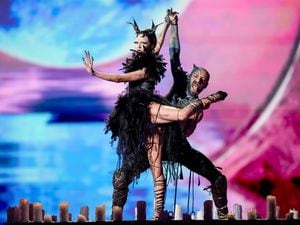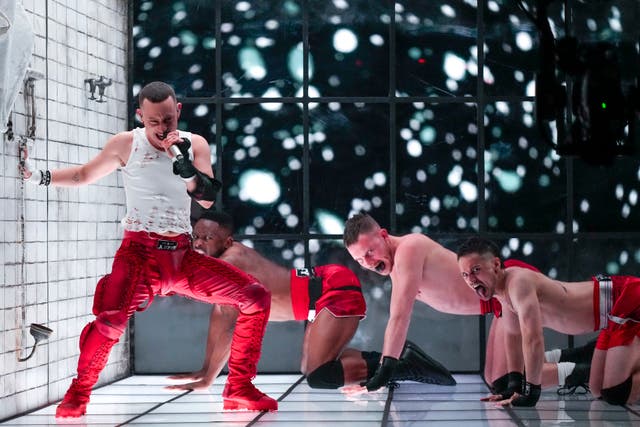Ireland’s Eurovision finalist: Organisers made me alter Palestinian message
Six years ago Ryan O’Shaughnessy reached the final of the competition with the song Together, and came 16th in Lisbon, Portugal.

The first Irish Eurovision Song Contest finalist since 2018 has criticised the organisers of the competition for asking them to alter a pro-Palestinian message.
Bambie Thug won a place in Saturday’s final with a mesmerising execution of their song Doomsday Blue at the semi-final on Tuesday in Malmo, Sweden.
The Cork-born singer, 31, told a press conference in Malmo they were forced to change their body paint in Ogham script – an early Medieval alphabet – which translated to ceasefire and freedom, a nod to the situation in Gaza and amid Israel’s inclusion in the competition.
“It was very important for me because I’m pro justice and pro peace,” they said.
“Unfortunately, I had to change those messages today to ‘crown the witch’ only (which was an) order from the EBU.”
A spokeswoman for the European Broadcasting Union (EBU) said: “The writing seen on Bambie Thug’s body during dress rehearsals contravened contest rules that are designed to protect the non-political nature of the event.
“After discussions with the Irish delegation, they agreed to change the text for the live show.”
The body had previously warned that Palestinian flags and symbols would not be allowed in Malmo Arena.
Despite this, former Swedish Eurovision contestant and opening act Eric Saade had a symbol, commonly used by people who want to show they are pro-Palestinian, on his arm.
The EBU said that it “regrets” that Saade chose to wear the keffiyeh pattern material and “chose to compromise the non-political nature of the event”.

Bambie Thug, whose black costume was removed during the performance to reveal a second outfit in the colours of the trans flag, said that they were completely “disassociated” and having an “out of body experience” after making Saturday’s final.
Ireland has not won since 1996 with Eimear Quinn’s The Voice.
Six years ago Ryan O’Shaughnessy reached the final of the competition with the song Together, and came 16th in Lisbon, Portugal.
Elsewhere, Olly Alexander delivered his first performance, which used rotating cameras to show an energetic upside-down locker room staging of Dizzy.
It is the first time the UK, which is already through to the final, has performed in a semi-final.
Also making the final were Ukraine duo Alyona Alyona and Jerry Heil with their religious infused Teresa & Maria, Finland’s Windows95man with the absurd No Rules! and Serbia contestant Teya Dora with Ramonda.
Cyprus contestant Silia Kapsis with Liar, Lithuania singer Silvester Belt with Luktelk, Croatia’s Baby Lasagna with Rim Tim Tagi Dim, Slovenia’s Raiven with Veronika, Portugal’s Iolanda with Grito, and Luxembourg’s Tali with Fighter will also compete on Saturday with those who go through from the semi-finals on Thursday.
The “big five” – the UK, Germany, France, Spain and Italy – are the biggest donors to the European Broadcasting Union (EBU) so have already made the final along with host Sweden’s entry Marcus & Martinus.
The Norwegian-born twin singers performed their love song Unforgettable which saw them turn the stage into a dance club.
The first Eurovision semi-final was hosted by Swedish comedian Petra Mede and Hollywood actress Malin Akerman.





